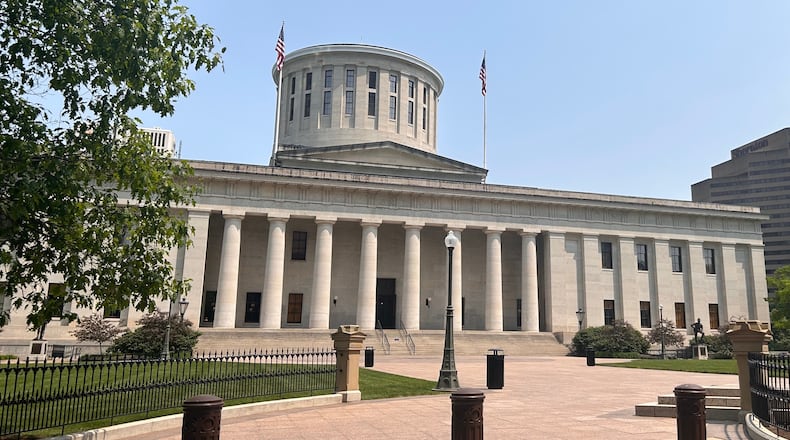The Senate approved House Bill 68 24-8 along mostly party lines — one Republican and all Democrats opposed it — after amending it to carve out an exception for Ohio minors who are already receiving transgender care so that they can continue to receive hormone treatment.
The House concurred with the changes 61-27. The bill now heads to Ohio Gov. Mike DeWine, who has not said whether he will sign the bill. He previously had expressed doubts about the sports restrictions, saying such decisions were best made by individual sports organizations.
Gender-affirming care ban for minors
As passed, HB 68 puts limits on how physicians can treat gender dysphoria. Physicians say there are three main avenues of treatment: counseling, hormone treatments, and gender-affirming surgery. HB 68 bans the latter two methods of treatment for Ohio minors and requires that counselors get permission from at least one parent or legal guardian before providing counseling on gender dysphoria.
Ohio’s medical professionals maintain that there are no clinics in the state that would perform gender-affirming surgery on a minor. But, there’s a small percentage of Ohio minors with gender dysphoria who are on hormone treatments ranging from puberty blockers to testosterone shots.
Over the past year, efforts to ban hormone treatment for minors has brought an onslaught of opposition from hundreds, ranging from transgender Ohioans and their families, Ohio’s children’s hospitals and medical associations, and transgender advocates who have argued against the state legislature interfering with necessary medical care in the state.
Dr. Kelly Blankenship, associate chief medical officer at Dayton Children’s Hospital and behavioral health expert, defended the use of hormone treatment for minors, saying that the treatment Dayton Children’s Hospital administers is peer reviewed and supported by specialists in pediatrics, psychiatry, medicine and endocrinology. She noted that all of the hospital’s treatment requires parental consent and encouraged lawmakers to vote against the bill.
“Transgender children, adolescents, and their families deserve care that is grounded in science, compassion and ethics,” Blankenship said. “In addition, the current version of HB 68 places higher barriers to access to mental health care for this condition, higher than for another condition. We should never make it harder to access mental health care for our children at a time when our children are in crisis.”
School sports restrictions for transgender girls
The proposal also would require public K-12 schools and universities to designate separate teams for male and female sexes, and would explicitly ban transgender girls and women from participating in girls and women’s sports.
At least 20 states have passed some version of a ban on transgender athletes playing on K-12 and collegiate sports teams statewide. Those bans would be upended by a regulation proposed by President Joe Biden’s administration that is set to be finalized early next year. The rule, announced in April, states that blanket bans violate Title IX, the landmark federal gender-equity legislation enacted in 1972.
The proposal would make it more difficult for schools to ban, for example, a transgender girl in elementary school from playing on a girls basketball team. But it would also leave room for schools to develop policies that prohibit trans athletes from playing on more competitive teams if those policies are designed to ensure fairness or prevent sports-related injuries.
Testimony overwhelmingly in opposition
Senate President Matt Huffman, R-Lima, told reporters Wednesday that he believes a “significant majority” of Ohioans support the measure, despite testimony on the bill being overwhelmingly in opposition.
“We don’t make laws just for the hundreds of people who come and testify, we make laws for over 11 million people,” Huffman said, before relaying his belief that the state needs to get involved in order to protect Ohio minors.
Senate Minority Leader Nickie Antonio, D-Lakewood, called the bill “yet another solution in search of a problem fanning the flame of the culture wars.”
“Ohio voters have repeatedly told us that they don’t want the government involved in their personal health care decisions,” Antonio said.
The bill did have proponents, including a variety of “detransitioners” — folks who regret undergoing hormone treatment or surgery in order to confirm their gender — who shared their negative experience and advised the Ohio legislature to protect other minors from a similar experience.
Morgan Keller, the only Ohioan who detransitioned to testify, lamented the permanent changes hormones made to her body and suggested that it was too easy to get put on hormone-blockers.
Keller testified that, at age 22, she underwent a double mastectomy under the advice of an Ohio-based medical professional.
“I couldn’t give informed consent at 21, so why are we pretending children can do that?” Keller asked in her testimony in November.
Others pushed back on the legislation because they believe it takes away a parent’s right to weigh in on their child’s medical care.
In June, West Chester Twp. Trustee Ann Becker, a notable Butler County Republican who chaired the county’s Donald Trump campaign, told House lawmakers that the bill was a government overreach that denies trans kids and their families medical autonomy.
“House Bill 68 says that transgender parents are not free or independent, House Bill 68 takes parents’ rights and turns them over to you, the state,” said Becker, who has a transgender son. “This is something that should not be happening in Ohio.”
“At some point, there’s a line drawn...,” Huffman said Wednesday. “Some parents may say, ‘You know, my parents beat me with a stick until I was black and blue and I’m going to do the same thing to my kid.’ Well, we prohibit that. So somewhere along the line, the state does have to intervene. It’s one of those things where it really is a protection of the child kind of thing.”
The Associated Press contributed to this report
Follow DDN statehouse reporter Avery Kreemer on X or reach out to him at Avery.Kreemer@coxinc.com or at 614-981-1422.
About the Author

